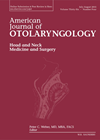
Journal Reviews
The ‘My Hearing Explained’ tool: audiologist and client perceptions
The study notes that the pure tone audiogram has been the primary clinical and counselling tool used by clinicians to assess and describe hearing thresholds to individuals and families since 1922. The Ida Institutes, ‘My Hearing Explained’ tool has become...
COVID vaccination and its relation to Bell’s palsy
The SARS-CoV-2 virus outbreak in 2020 continues to be investigated as well as its after-effects on those infected by it. The vaccines created for the public were groundbreaking achievements, evidenced by the lives saved by them and the return to...
How reliable is non-echoplanar diffusion-weighted MRI in picking up postoperative cholesteatoma in children?
Cholesteatoma occurs more often in children than in adults and is more aggressive, often resulting in ossicular erosion and marked conductive loss, amongst other more serious possibilities. Recurrence happens in all three methods used, namely canal wall up, canal wall...
To endo or to micro, that is the question: the musculoskeletal paradigm
Endoscopic ear surgery is a newer concept compared with the microscopic one. Both could lead to musculoskeletal pain due to the long static posture of surgeons during otologic procedures. The authors conducted a study on eight otolaryngologists, four attendings and...
What is the quality of patient-reported outcomes of salivary function?
Salivary gland dysfunction has multiple causes and can have significant impact on quality of life, particularly when symptoms are severe. There are several patient-reported outcomes (PROMS) that assess these issues; however, these are variable in what they measure. This systematic...
Cognitive function is preserved in episodic vestibular disorders
Cognitive deficit in bilateral vestibular failure in particular, but also in unilateral vestibular failure, is well documented. The authors designed this prospective study to determine if deficits in cognition, as well as anxiety and depression, were present in episodic vestibular...
Does middle turbinate resection affect olfaction in endoscopic transsphenoidal surgery?
The middle turbinates (MT) are sometimes partially resected during endoscopic transnasal transsphenoidal pituitary surgery to improve surgical access. Some outfracture the middle turbinates instead. This article presents results of the first prospective randomised study, investigating the effects of such surgery...
Hurdle jumping
This article deserves a little attention, rather like settling into conversation. As the writers state, listening is an effort and is a tricky field of study when combining multiple physiological measures. In order to gain an understanding, they suggest: consider...
I saw it on the internet: gathering evidence for clinical decision making
Evidence-based practice is often described as the integration of three sources of information to inform clinical practice, namely: 1) research evidence/practice guidelines; 2) client preferences/needs, and: 3) clinical experience. Speech and language therapists have reported a lack of time and...
Hearing difficulties and memory problems
Since the Lancet Commission report in 2020, we have all been aware that untreated hearing loss is potentially one of the biggest modifiable risk factors for dementia in midlife. Hearing loss is also associated with other risk factors for dementia,...
Extracapsular dissection alone for low-grade malignancies of the parotid gland – oncologically sound?
The general treatment strategy advocated for a primary carcinoma of the parotid gland is surgical resection +/- adjuvant radiotherapy. A selective neck dissection is usually recommended in all cases of parotid malignancies, except for small, low-grade tumours. In this paper,...
The future of biologics?
This paper takes a deep dive into how eosinophilia affects the responsiveness of the host to the two monoclonal antibodies mepolizumab and bendralizumab, both of which are active against IL5. We know that eosinophils are attracted and trapped into the...

















